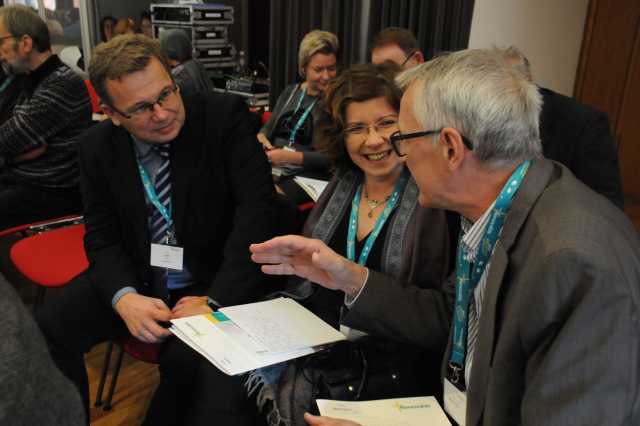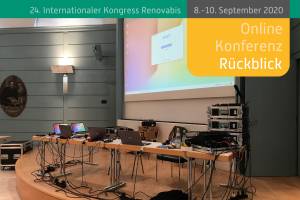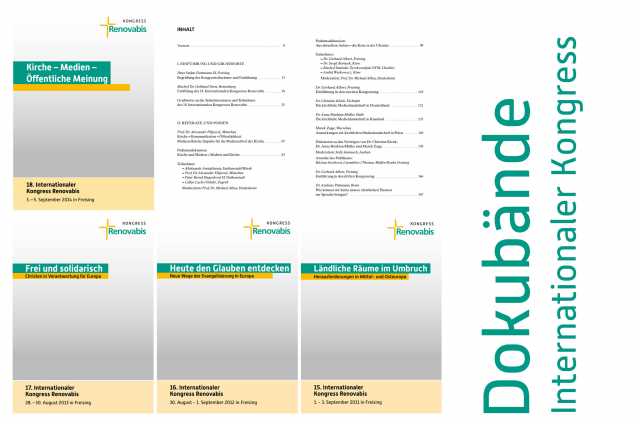
Source: Heike Faehndrich
24th International Congress Renovabis
Online instead of offline
Originally, the 24th International Congress Renovabis was to take place in Munich from 9-11 September 2020 – however, due to travel restrictions during the COVID-19 pandemic and in order not to take any unnecessary risks for all participants, the planning team had decided to postpone the planned presence event on the topic „Ecumenism in Central and Eastern Europe – Task and Enrichment“ until 2021.
Nevertheless, Renovabis wanted to get into conversation with its partners and friends about what people around the world were concerned about in the last months: The Corona Pandemic. Therefore, from 8-10 September 2020 seven online-based individual events were held on the topic COVID-19: A new Challenge for Church and Society in East and West. More than 280 people registered for the Zoom-based meetings and participated in discussions, chatted and listened attentively.
Corona and the People on the Edge of Society: We need to talk!
Tuesday, 8 September 2020 - 10:00 a.m.
The congress was opened by Renovabis director Father Dr. Christian Hartl (in the photo collage top right). The first event of the congress was dedicated to the topic "Corona and the people on the edge of society: We have to talk to each other! Around 120 participants exchanged their experiences with people in particular need - e.g. the seriously ill, homeless or refugees. The discussion was moderated by Martin Lenz from the Renovabis project department.
- Sr. Veronika Mila Popić, Depaul Hrvatska (top left)
- Dipl.Theol. Ursula Kalb, Community of Sant’Egidio Munich (bottom right) and
- Miodrag Živković, Jesuit Refugee Service Serbia (bottom left).
Sister Veronika Mila Popić from Croatia reported on her experiences with visitors to the day care centre who were no longer allowed to come to the facility because of the Corona pandemic - and her fears that people could become lonely and depressed. She called for a more intensive examination of the question of how the cracks in society develop, where homelessness, for example, has its origins - this was the point to start from.
Ursula Kalb, a graduate theologian, pleaded for more imagination and flexibility - „not a trace of normality“, she emphasised. Nevertheless, the Community of Sant'Egidio from Munich also sees positive aspects: Many new volunteers have been recruited, including many younger people.
When the Soul is out of Balance: Psychosocial Consequences of the COVID-19 Pandemic
Tuesday, 8 September 2020 - 2:00 p.m.
It is not possible at present to predict the far-reaching consequences of the crisis and its associated restrictions on people's psychosocial development. However, initial studies suggest that many people have perceived the pandemic as an existential threat with drastic consequences for their life prospects. In accordance with the three-step „See - Judge - Act“, this forum dealt with the psychological effects of the corona measures and the lockdown. Discussants were
- Dr. Klemens Ochel, Medical Mission Institute Würzburg (Moderation; in the poto collage bottom left)
- Maria Rúdan (Child Protection Officer of the Hungarian Conference of Religious Superiors; bottom right)
- Dr. András Márton, Caritas Alba Iulia, Romania (bottom centre)
- Dr. Amir Hasanović, NARKO NE, Sarajevo, Bosnia and Herzegovina (top left)
András Márton from Romania reported on many labour migrants who returned home during the peak of the Corona pandemic - with serious consequences: The additional income was lost, but there was one more eater and less space. Sometimes the domestic quarantine took place in a very confined space (sometimes 15 people in two rooms), and homeschooling was added.
Maria Rúdan from Hungary called for the education system to level out differences in order to contribute to equal opportunities. Parents and teachers had to be informed about the dangers of the Internet and social rules on the net had to be pointed out. Due to the increased online time she fears an increase in the search for illegal content on the net - this poses dangers especially for children. An experience which Amir Hasanović from NARKO NE also confirmed. His conclusion: children and young people are the absolute losers of the Corona crisis, especially if they come from socially weak families. It shows how important it is to increase resilience so that people are better able to deal with the effects of the crisis.
Livestream from the House of the Lord? Experiences and Impulses from the Time of the Corona Restrictions
Wednesday, 9 September 2020 - 10:00 a.m.
„Social Distancing“ is a special challenge in pastoral ministry. How are churches in East and West reacting to the COVID 19 pandemic? How have the tasks and requirements for pastoral workers changed? What new ideas has the crisis brought forth? The event was organised in cooperation with the Catholic Centre for Missionary Pastoral Work (KAMP, Erfurt), and was moderated by Andrea Imbsweiler (KAMP).
After some impressions on pastoral offers during the lockdown from different countries in Eastern Europe, there were three short lectures: Dr. Dénes Kiss from the University of Cluj in Romania presented a study that shed light on religious life under the curfew in Transylvania. It was astonishing how well the online transmissions of religious services were received. Users of online services were often younger and better educated, and more women were among them. Prof. Dr. Klára Csiszár (Univ. Linz/Univ. Cluj) formulated pastoral theological considerations in the light of the pandemic experience under the title „How it was before the crisis, it's also in the crisis?“ and drew parallels between the experiences of the church under communism and during the lockdown. Finally, Dr. Hubertus Schönemann (KAMP, Erfurt) presented the situation in Germany and gave the sobering conclusion that the lockdown had further strengthened existing doubts about the official church's authority to interpret the situation.
Humanity and the COVID-19 Pandemic: Biblical Approaches on how to deal with the Crisis
Wednesday, 9 September 2020 - 2:00 p.m.
Whether earthquakes, plague epidemics or sudden death: the question of why a merciful God permits illness and suffering has been asked for thousands of years. In the Old and New Testament, the image of the „suffering righteous man“ is one of the most catchy metaphors, and the Book of Job is dedicated to the subject as a whole.
In a longer (472 KB; 7 pages), Dr. Halyna Teslyuk (lecturer for Old Testament at the Catholic University of Lviv/Ukraine; in the photo collage on the top left) illuminated various aspects of the topic using biblical texts. Her conclusion: The biblical passages, especially in the Book of Job, show how important communities are for overcoming crises. She demanded not to put too much emphasis on liturgical rituals like hand communion or peace greetings, which are not possible in Corona times, but to focus on the community in order to find hope for the future. In the following, partly very personal conversation with Dr. Josip Bošniaković (priest, psychotherapist and lecturer for psychology of religion at the University of Djakovo/Croatia; top right), very concrete experiences from pastoral care, but also private experience were included. The closing words of Dr. Bošniaković, also and especially in the time of the Corona pandemic: „We live in a community where solidarity is necessary“.
Orphaned Educational Institutions and full Data Highways: Church Adult Education in Times of COVID-19
Wednesday, 9 September 2020 - 4:30 p.m.
Within the church, not only pastoral care in the narrower sense was affected by the pandemic, but also church educational institutions, which were no longer able to provide their usual services, and in some cases developed new digital formats. The financial shortfalls have threatened the continued existence of many educational institutions and other adult education programmes - in Germany as well as in Central, Eastern and South-Eastern Europe.
These problems, but also the chance to break new ground, were the focus of the discussion between
- Dr. Claudia Pfrang, Directress of the Domberg Academy Freising (likewise moderation)
- Dr. Jan Heinzl, Director of the Hejnice Monastery's Educational house (Czech Republic)
- Dr. Šimo Maršić, Director of the Youth Centre „John Paul II“, Sarajevo (Bosnia and Herzegovina)
Genuine encounters require spatial togetherness, because communication consists to a large extent of body language. For this reason, digital forms of encounter require different methods - and educational work has to adapt to this, so that it can also work successfully digitally, the panel participants emphasised. Šimo Maršić from Sarajevo (right) described how well the daily short impulses of the Youth Centre "John Paul II" were received on Facebook during the lockdown: the number of young people reached was higher than in the times before the Corona crisis - especially during the crisis the need for conversation was very high.
Europe at the Crossroads: Unity or Dissension – The Corona Crisis and its Consequences for Europe
Thursday, 10 September 2020 - 10:00 a.m.
A visible sign of the crisis at European level was the closure of borders, often without prior notice or consultation with neighbouring countries. The European Union reacted hesitantly and rather helplessly, the crisis within the Union, which had already been smouldering for some time, deepened and new rifts between „North“ and „South“ opened up alongside the existing rifts between „West“ and „East“. But even in the midst of the crisis there was help and solidarity, not least because the churches repeatedly pointed out the unifying factors in Europe.
Under the direction of the journalist Marek Ząjac from Poland (bottom left), MEP Sven Giegold (Bündnis 90/Die Grünen; bottom right) and the religious studies expert Prof. Dr. András Máte-Tóth (bottom centre) from the University of Szeged in Hungary discussed the issue with each other. A video impulse by the President of COMECE, Archbishop Jean-Claude Cardinal Hollerich SJ (Luxembourg; top left), gave initial impulses for the lively discussion. He called for full solidarity in Europe - a community of destiny that had to learn together how to share.
MEP Sven Giegold concluded that the feelings of solidarity had grown - after a difficult beginning, when Germany, for example, kept capacities of intensive care beds open for its own citizens. In the meantime, the political course has also been set more in the direction of solidarity, for example by Europe taking on debt together to help the weakest and most affected countries in Europe. The voice of the church in the crisis, said Giegold, „was not the loudest, to say the least.“ This also applied to the current challenge in Greece (Moria refugee camp).
András Máte-Tóth stressed that the Corona crisis had particularly affected the countries in Eastern, Central and South-Eastern Europe, which had already been weaker than the countries in Western Europe. He added that this was compounded by past experience and, in many cases, the „victim role“ of the people involved. András Máte-Tóth appealed to the churches that especially in the countries of Eastern Europe they had the decisive opportunities to relativise national egoisms and build bridges.
The conclusion of Marek Ząjac: „Every crisis shows the true face of those affected - but it is always also an opportunity to do something better.“
Between Slaughterhouse and Brain Drain: Labour Migration and COVID-19
Thursday, 10 September 2020 - 2:00 p.m.
The still precarious situation of migrant workers in Germany was brought to public attention by the pandemic, when mass infections occurred in the accommodation of slaughterhouses and large agricultural enterprises. Particularly affected were workers from Romania, Bulgaria and other countries of Central and Eastern Europe, whose fate trade unions and churches have been pointing out for years without any significant response. Father Wolfgang Herrmann (top right), head of the Stuttgart corporate chaplaincy, introduced the almost 100 participants to the topic. The COVID-19 pandemic had only made the significance of labour migration clear, although the topic had been known for a long time: in the crisis, Herrmann said, it had become clear as if through a magnifying glass that workers from Eastern Europe were systemically relevant - whether in agriculture, nursing or transport. His remarks were supplemented by Dragana Bubulj ("Fair Mobility" project, Stuttgart; bottom right).
The political scientist Prof. Dr. Tado Jurić from the Croatian Catholic University of Zagreb (bottom left) had clear words about the situation in Croatia: Since 2013 about 50,000 people have emigrated from Croatia to Germany every year. Each of these workers costs Croatia between 50,000 and 100,000 euros - and Germany gets the young, well-educated people for free. Germany in particular could exert a lot of political influence to alleviate the problem of the „brain drain“, „but Germany shows little interest“, says Professor Jurić.
However, the reasons for emigration are not only the higher wages in Germany, but people are also „tired" of fighting corruption in their home countries and getting involved in civil society. This is not least due to the structural problems with power elites that date back to communism.
Greeting words to the congress
–
–
Do you have questions or suggestions concerning the Renovabis Congress?
Then simply write us an e-mail or call us:
More about the International Congress Renovabis

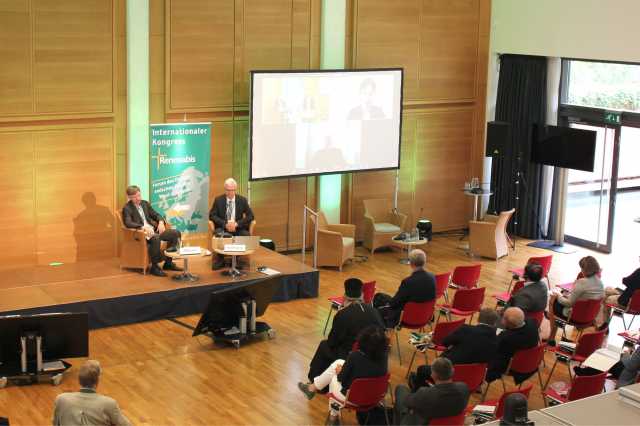
24th International Congress Renovabis
Read more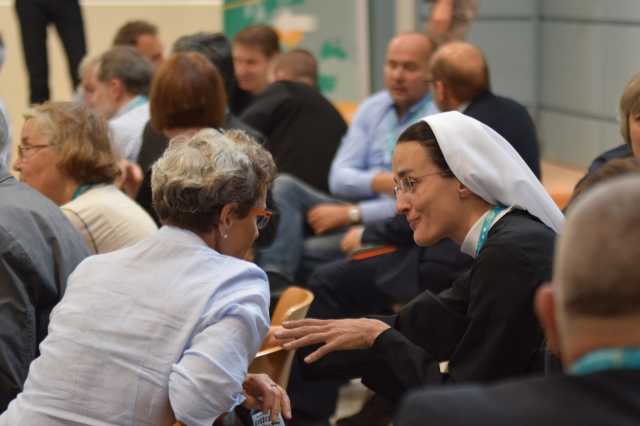
International Congress Renovabis
Read more